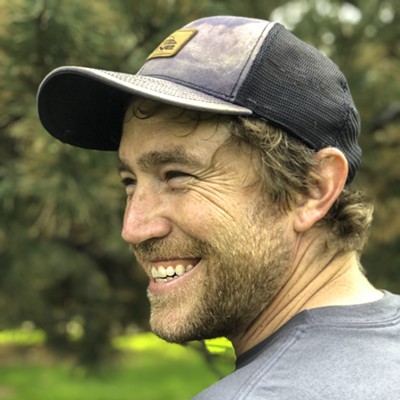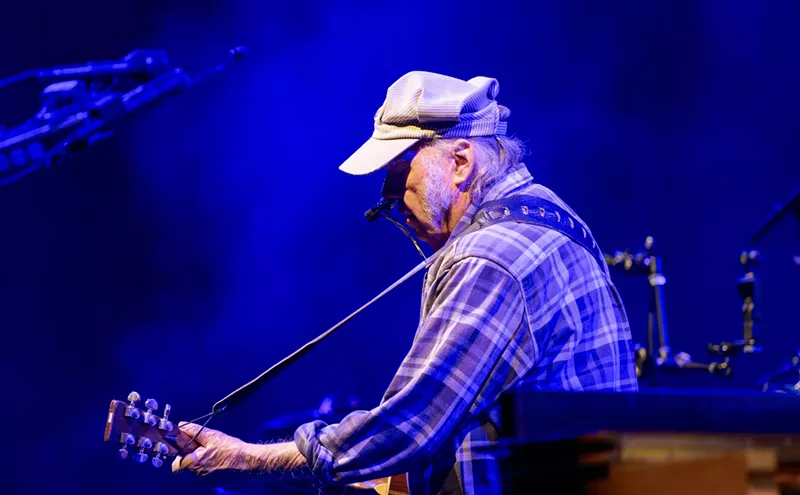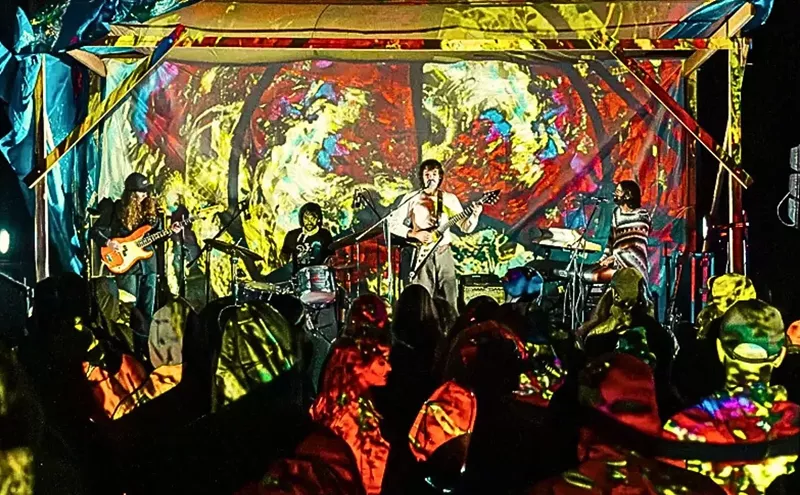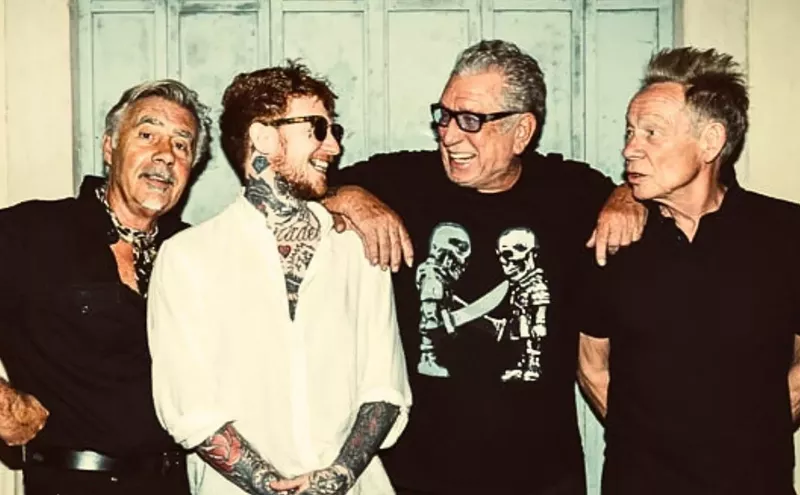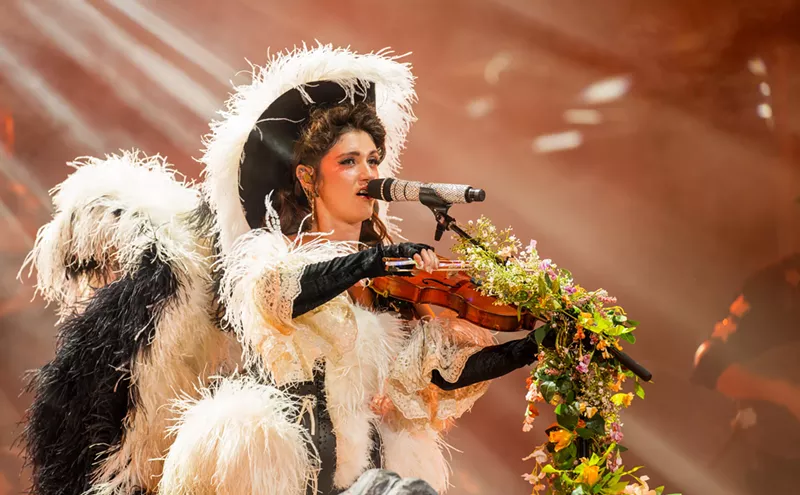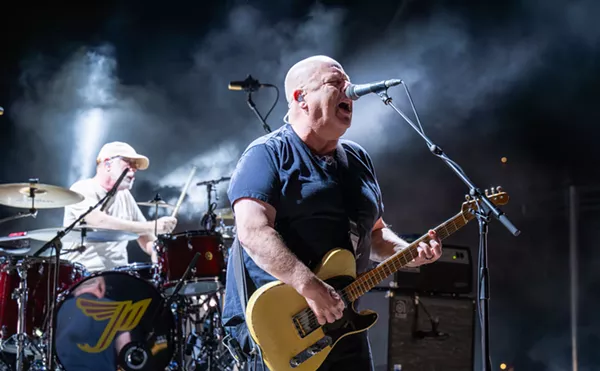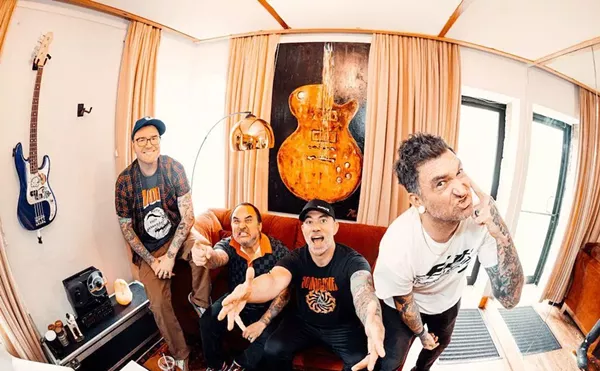Westword:Lets talk about the new album: It's super electronic. What might have influenced that transition?
Jesse Miller:I think it's only more electronic by comparison to some of our older material. I think when people think electronic music, they think all electronic beats: Sampled beats, this kind of computer-oriented production. It's definitely a live band and we have really always wanted to keep that live band sound. That's very true of this album. Part of the lean in that direction, our older albums Hammerstrike and Oil on Glass/Feather on Wood, were kind of post rock and guitar oriented material. It's just kind of a change of that and we started writing more towards the synth and giving it more of the lead, and stuff. Part of what was working at our shows was bigger beats, and you know, stuff that was really hitting the dance floor.
What outside influences warranted bringing on the heavier synth and to start incorporating that in your live production?
It's the sound we touched on long before we did this album. It's not a giant stylistic jump. I would say lately, or really coming into the preparation of that album, we were listening to a fair amount of Neon Indian, and we really were into what he was doing with his, weird, lo-fi synth stuff. One thing that was influential for Luke was going and taking the idea of the tempo in hip-hop, like 88 BPMs to about 95BPMs, and he wrote a lot of stuff in that realm. We didn't have a whole lot of that before, so we took that in a whole new direction.
And where do you see it going now? What would you like to implement in terms of that implementing the samples?
At the cost of evolution, we are always going to try new thing. One thing that is easy to do, with me triggering samples and playing bass, is get way too layered. Like, if you have to many things happening. I think as of late we have really made a concerted effort in our composition of late to really trim stuff down, and, maybe we don't need this extra keyboard here. Finding that power in that stuff that is much more simple than maybe how we would've approached it in the past. For me, the ultimate goal is to make these tracks that are really going to kill live and have this energy. They are really focused down on what the compositions are.
With that said, do you have any favorites off the new album?
One of my favorites Is "Golden Ghost." For me, that was a song that I wrote that kind of brought the whole idea of what the album could be. We wrote two albums worth of material, and writing that song kind of gives this idea that this is how I see this album. I immediately saw it as the lead off track for the album. It's going to be an upbeat kind of thing and kind of lean in the electronic kind of direction. There is a real kind of collage element at the end where a lot of things are cut up and working together. Other tracks will be connected through that composition.
Is "Golden Ghost" the backbone of the album, then?
I don't know about the backbone, but definitely a touchstone. A jumping off point, stylistically.
What kinds of things influence your themed shows?
Usually, when we do it, we pick a show that we want to be a little bit different or special some how. We will pick up a show in advance, like if it's a Halloween or New Year's shows. Picking the theme can take a long time. We all have pretty big opinions, so it's hard to come to a consensus of a theme. Every once in awhile someone comes with a really good idea and we say, 'We can run with this.' I always find those shows to be a lot of work, but there is a lot of payoff in the end, especially if we are doing covers.
It's one thing to listen to an artist and saying, "I understand what they are doing with this beat, or this chord change,' but when you really have to dive and learn these compositions inside out, and learn how all the nuance pieces working together, I feel like I always take something away from that. I never thought to use this scale in the way they are using that, or the way they turn this phrase: I've never used it that way before. It's fun for the fans, but it's ultimately a learning experience as well.
Does it help you learn a new respect for a certain artist?
The David Bowie one stands out. I have always liked Bowie, but it wasn't really until I delved into these songs that I really thought, 'man, this guy is just a genius! Everything he touches, he makes interesting somehow that I wouldn't have known just listening to in causally.
With those kinds of improvisations in mind, what is the band dynamic when you are composing an album?
Myself, and Luke do most of the composing. Luke probably does about 60-65 percent, and I do 35-40 percent, somewhere in that range. We tend to work very much on our own for the original compositions. Say Luke finishes a demo; he'll send it over to me, and say, 'what suggestions do you have?' I'll go through and determine what needs to be changed, and what needs to be cut, or what needs to be punched up a little bit.
Sometimes, he'll implement those changes or I'll rework it and make something different. That's what we start with. Then we take it to the band as a very completed demo, and from there we start working on it as a band. From there, we make some changes in arrangements, but from that piece, that is usually pretty close to what the end product is going to be.
What about with Chuck [Morris] being back? I know he went on hiatus with some new family stuff, so, how has the reception been with having him back, and the general chemistry of the band kind of coming back together?
It's been interesting. I feel like we've kind of redefined his role and found that in some cases that he is doing the same things as before, but we kind of explored new ways of approaching things when we played as a four-piece band. We've been slowly working back into it. Something's we did different before, and something's we have a new system of doing it. We spent a lot of time in the fall rehearsing, really trying to workout detailed parts of songs.
How many shows do you have lined up this year?
After this show on Saturday in Denver, we have about a month long tour in the US, then we head over to Amsterdam for "Jam of the Dead Festival," and then coming back and doing a few weekends before starting into the whole festival thing. After the tour, it's really like 'Ok, here's this weekend of festivals,' kind of thing. That season is extended May through September.
Any Japan stops lined up?
Yea! We are going to Japan in the beginning of May.
Does Japan really have an ear for Lotus?
They have communities that enjoy our music, and when we first went over in 2007, that first time people were down with our music, and you could walk into a CD or record shop and our CDs would be on display there. We have had a chance to go back and play some festivals and club stops, and even though they aren't massive clubs, they sell out. There is a pocket of fans who are aware of what's going on in the Lotus/jam connections, and in that element of mixing electronics. That is something I think really resonates with fans over there.
What is it like starting a band, released several albums under different record labels, and walking into a record store in Japan and seeing your albums?
It's pretty awesome. You know, when you start it's really all about getting your music to the most people, so I never really thought about Japan until they started distributing over there.
What do you think about people doing live recordings at your shows?
We've never discouraged it. It's funny how that scene has really changed over the years. It started out that people would pretty regularly tape live shows and post them on Archive, or trading CDs; we were coming up in that era. Now, we do high quality, multi-track recordings that are available on our website a few days after the show for $10. The taping thing has really tapered off because they know they can't a way higher quality directly from us. A Lotus show is something special, hopefully, so it's cool that people are interested in what we are doing at a live show verses a studio recording.
Finally, what's one of the crazier things you've seen at one of your shows?
Well, something crazy happens at all our shows, but this one time a pickup truck was parked in front of our tour bus, and we couldn't get out. I rallied people that were still around and we picked it up and moved it. So yea, if a truck blocks you in, you can pick it up and move it.


